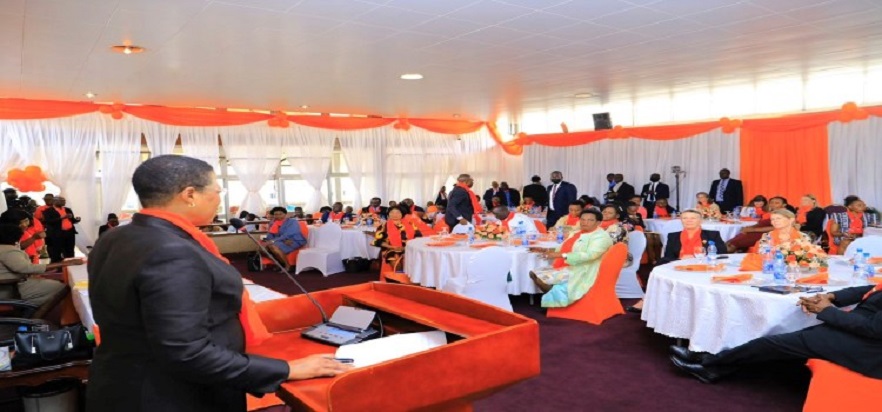Finance PS Ramathan Ggoobi
The Ministry of Finance allayed fears that the agreement recently signed with an Italian-based company, Uganda Vinci Coffee to process and export coffee, will in no way create a monopoly in the coffee industry.
Speaking about the agreement at the Ministry of Finance Headquarters in Kampala on Thursday, Permanent Secretary Ramathan Ggoobi downplayed the Vinci Coffee deal as one that will only consume a small part of the coffee that the country produces, and there is no way is can create a monopoly.
Uganda’s coffee farmers were up in arms against a government decision to offer the European company preferential treatment in the coffee sector. Earlier, Minister Frank Tumwebaze, whose first well known contribution to the country’s economy was the promotion of Uganda National Farmers Federation and is now the country’s Agriculture minister distanced himself from the deal, referring all queries to the Finance Ministry.
“A note to journalists calling me and seeking to know more about the coffee agreement recently signed between the government of Uganda with one investor; be advised that neither myself nor the Ministry of Agriculture, Animal Industry and Fisheries, is a party/privy to that agreement,” he said in a general tweet.
Tumwebaze advised that all questioned be directed to the ministry of finance, which drew more questions on social media.
An agreement reached in February between the Ministry of Finance and Uganda Vinci Coffee Company, is aimed at boosting value addition to the commodity before it’s exported.
The incentives include “taking all reasonable measures to give priority of supply of coffee to the company” before allowing any export of coffee beans.
Also, the company undertakes that it will pay for the priority “quality coffee beans at a premium price to be determined by the company,” but in any case the price determined will not be lower than the price determined by a relevant authority, whichever is lower.
Uganda National Farmers Federation said this is creating a monopoly and will make it hard for local companies to develop, unless they are given similar or better offers.
Peter Kisambira, the Director Agri- Business, at the Uganda National Farmers Federation says it can only be accepted when there is equality with all investors in the country.
PS Ramathan Ggoobi said the government is ready to extend the same incentives to local investors, citing the current decision by the ministry of energy and mineral development to transmit electricity directly to industrial parks and at a low-cost to the users. The company will for example have a 10-year tax holiday, while the government will supply electricity to it at 5 US cents, compared to the market price of almost 13 cents, as well as subsidized water supply.
The Ugandan entrepreneurs want similar incentives extended to whoever wants to invest in coffee processing.
The Permanent Secretary Ministry of Finance, Planning and Economic Development, Ramathan Ggoobi says that according to the agreement, Vinci will only require 60,000 tonnes of coffee bean per year, at full capacity, and 27,000 tonnes initially.
This, according to him is a very small part of the total 480,000 tons produced by the country every year, adding that in any case, monopolies are against the law in Uganda.
The Secretary to the Treasury also adds that the Ugandans opposed to the deal misinterpreted what is in the agreement, citing the clause on prices, as well as enabling the investor to access raw materials.
Ggoobi says that the company will buy the coffee at a premium price, the first pricing system in Uganda, and not lower than that determined by the Uganda Coffee Development Authority.
He adds that the aim of the deal with the company is to ensure improved marketing of Uganda’s coffee and the export of processed coffee, which in turn adds to the value earned by the farmers from their sweat.
One of the coffee farmers who has supported the deal is former agriculture minister Victoria Sekitoleko, who has also represented Uganda at the International Coffee Organisation before.
“There is need to attract investors into the coffee industry so as to develop the export of processed coffee for better earnings. In any case 60,000 tonnes out of a total 480,000 tonnes should not worry Ugandans,” she says.
But Agriculture minister Frank Tumwebaze is not easilly being let off the hook of responsibility in the matter that he says he is not privy to. The former Commissioner for Customs at the Uganda Revenue Authority and now MP Dicksons Kateshumbwa said that the agreement violated the Public Finance Management Act.
“That agreement violates the PFM Act and undermines economic liberalization. We have had a success story in the coffee sector and creating a monopoly without clear justification will have negative consequences on the sector,” he said in response to Minister Tumwebaze’s tweet.
A development Policy Analyst Dr Allan Bomuhangi demanded that the agriculture minister should pronounce himself on the deal.
“That does not mean that we shouldn’t hold you accountable,” Bomuhangi said. “The coffee sub-sector is directly under your supervision sir. Man up and give us your position as chief custodian of the ministry,” he said.
-URN





